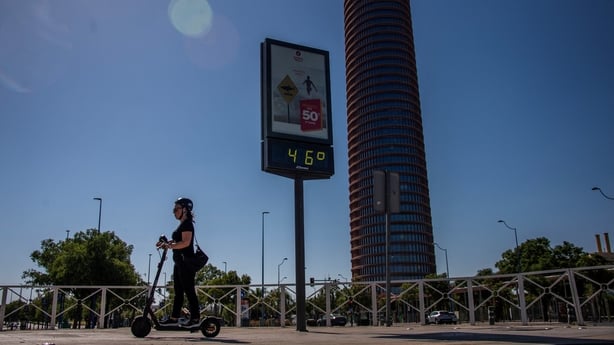The EU Court of Auditors has said that economic losses from extreme climate-related events would cost EU countries between €42bn and €175bn per year if average global temperatures rise by between 1.5 to 3 degrees Celsius.
It warns that this is a conservative estimate of the potential damages ahead.
During the last decade average economic losses from extreme climate-related events in the EU amounted to €26bn per year.
The EU allocated at least €8bn in 2014-2020 and €26bn in 2021-2027 for climate adaptation.
However, the Court of Auditors found that about 40% of the EU-assisted climate adaptation projects it examined in France, Poland, Estonia and Austria had little or no impact.
It said overall EU progress towards climate adaptation is difficult to measure.
Today's report says reducing greenhouse gas emissions alone cannot prevent the effects of climate change.
That is why adaptation efforts are becoming increasingly necessary and essential to complement climate mitigation.
Climate adaptation is described as the process of adjustment to actual or expected climate change effects, rather than a one-time emergency response.
It is a series of prevention and protection measures needed to live with likely hazards such as drought and sea-level rise, exposures such as the risks to water supplies and vulnerabilities such as poverty and the lack of education.
This requires that governments anticipate local climate impacts and come up with measures to address them.
It also includes taking advantage of opportunities that may arise due to climate change such as the potential for growing new crops or exploiting potential higher yields for existing crops.
The Auditors say there is a risk that the EU’s adaptation policy might not keep pace with climate change as extreme climate events such as heatwaves, drought and flooding are occurring with increasing severity and frequency, and with major economic consequences.
Today’s report notes that there has been a surge in the number of climate disasters in the EU over the last two decades and in the level of damage caused.
We have seen this with recent droughts, heatwaves and devastating floods in 2024, it said.

The EU strategy is to become climate resilient by 2050 and this objective is also enshrined in the 2021 European Climate Law.
Given the cross-cutting nature of actions related to climate adaptation, estimating the relevant EU funding is difficult because it is spread across several other EU policy areas such as agriculture, cohesion and research.
For today’s report the European Court of Auditors assessed 36 climate adaptation projects in the four countries – France, Poland, Estonia and Austria.
It found that over half of the projects did address climate risks effectively. However, 13 had little or no impact.
It also found examples of maladaptation – where projects end up increasing vulnerability and exposure to climate change rather than reducing it.
For instance, they found projects addressing needs for increased agricultural irrigation at the risk of increasing overall water consumption, or a project for flood protection where building permits were still being issued for new houses in the same risk area.
Examples of maladaptation include promoting irrigation for water-intensive crops instead of switching to less water-intensive ones. Another involved investing in energy-saving artificial snow cannons instead of focusing on year-round tourism.
The auditors surveyed 400 municipalities in the audited member states and found that respondents were largely unaware of climate adaptation strategies and plans and were not using the relevant EU climate adaptation tools.
Klaus-Heiner Lehne, the ECA Member responsible for the audit said:
"We looked at how the EU is addressing the urgent need to adapt to recurring extreme climate conditions. We found issues in the way policies are implemented on the ground. If the implementation of EU action does not improve, there is a risk that EU adaptation ambitions may not keep pace with climate change."








